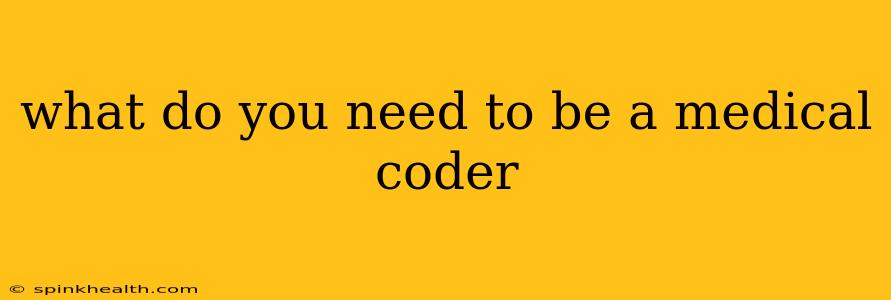What Do You Need to Be a Medical Coder? A Journey into the World of Healthcare Billing
The world of healthcare is complex, and behind every doctor's visit and hospital stay lies a crucial process: medical coding. Medical coders are the unsung heroes who translate medical diagnoses, procedures, and services into numerical and alphanumeric codes used for billing and insurance claims. It's a rewarding career with a growing demand, but what exactly do you need to become a successful medical coder? Let's embark on this journey together.
The Essential Ingredients for a Successful Medical Coding Career:
1. Education and Training: What kind of education is needed to become a medical coder?
This is the cornerstone of your journey. While a bachelor's degree isn't always mandatory, a strong foundation in medical terminology, anatomy, physiology, and medical billing practices is absolutely essential. Many aspiring medical coders opt for one of the following paths:
- Associate Degree in Health Information Technology (HIT): This is a popular choice, providing a comprehensive curriculum covering medical coding, billing, and health information management. It usually takes about two years to complete.
- Certificate Programs in Medical Coding: These shorter programs (often 6-12 months) focus specifically on coding skills, making them a faster route to entry-level positions. However, they may not cover the broader aspects of healthcare administration as comprehensively as an associate degree.
- Online Courses and Self-Study: Numerous online resources offer medical coding training. These can be a great supplement to formal education or a starting point for those exploring the field, but it's crucial to choose reputable programs that meet industry standards.
2. Medical Terminology Mastery: How important is medical terminology for medical coding?
Extremely important! Medical coding relies heavily on understanding the precise meaning of medical terms. Without a solid grasp of medical terminology, you won't be able to accurately translate patient records into codes. Think of it as learning a new language, but with the potential to impact people's healthcare access.
3. Coding Systems Proficiency: What coding systems do medical coders use?
Medical coders need to be fluent in several crucial coding systems, primarily:
- ICD (International Classification of Diseases): This system codes diagnoses and reasons for visits.
- CPT (Current Procedural Terminology): This system codes medical procedures and services.
- HCPCS (Healthcare Common Procedure Coding System): This system codes medical supplies, equipment, and services not covered by CPT.
Familiarity with these systems, and the ability to navigate their nuances and updates, is vital.
4. Attention to Detail and Analytical Skills: Are attention to detail and analytical skills important for a medical coder?
Absolutely! Medical coding requires meticulous attention to detail. Even a small error in coding can lead to incorrect billing, delays in payment, and potentially even harm to patients' access to care. Analytical skills are also crucial for interpreting complex medical records and ensuring accurate code assignment.
5. Computer Skills: What computer skills are essential for medical coders?
Proficiency with computers and relevant software is essential. Medical coders use electronic health records (EHRs) and specialized coding software daily. Strong keyboarding skills and familiarity with various computer programs are key.
6. Certification: Is medical coder certification important?
While not always mandatory, obtaining a medical coding certification is highly recommended. Certification demonstrates your competence and enhances your job prospects. Some well-regarded certifications include the Certified Professional Coder (CPC) and the Certified Coding Specialist (CCS).
7. Continuous Learning: Do medical coders need continuous professional development?
The healthcare landscape is constantly evolving, with new codes, regulations, and technologies emerging regularly. Continuous learning is vital to staying current, maintaining competency, and ensuring accurate coding practices.
Becoming a medical coder involves dedication, commitment, and a passion for detail. With the right education, training, and a keen eye for accuracy, this career can provide a fulfilling and impactful experience in the healthcare sector. So, if you’re intrigued by the intricate world of healthcare billing and are ready to dive into the details, the path to becoming a medical coder awaits!

